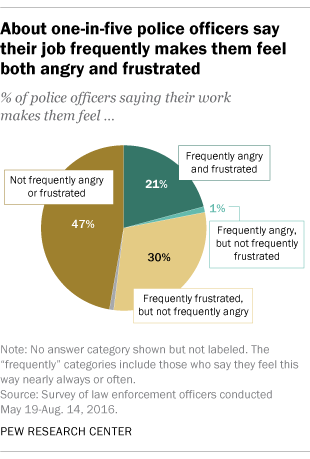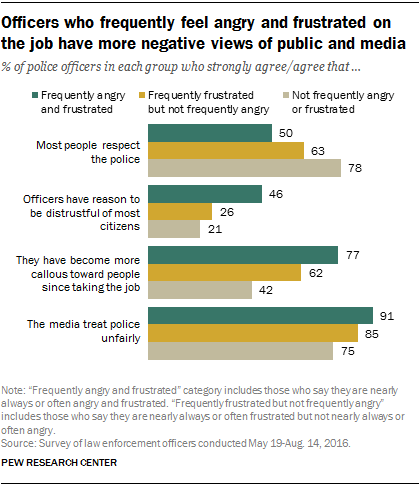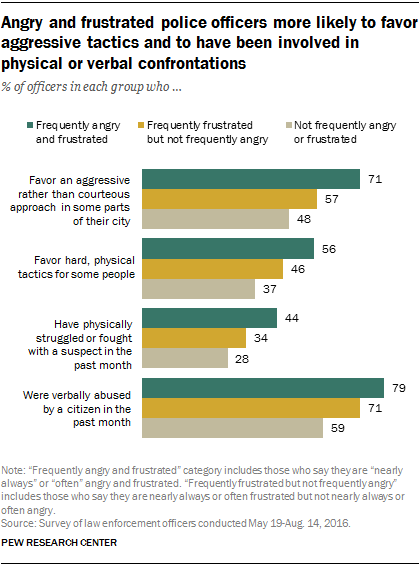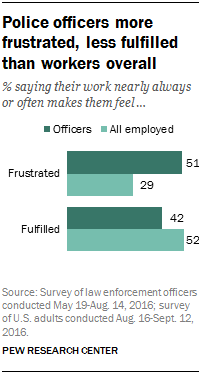
About one-in-five police officers nationally (21%) say their job nearly always or often makes them feel angry and frustrated – feelings that are linked to more negative views toward the public. These frequently angry, frustrated officers also are more likely than their colleagues to support more physical or aggressive policing methods, according to a Pew Research Center survey conducted May 19-Aug. 14, 2016, by the National Police Research Platform of 7,917 sworn police and sheriff’s officers in 54 departments with at least 100 officers.
Frustration is more prevalent than anger among today’s police officers. About half of the officers surveyed (51%) say their work nearly always (10%) or often (41%) makes them feel frustrated, while 22% say they nearly always (3%) or often (19%) feel angry. When these two measures are combined, a total of 21% of officers say they nearly always or often feel angry and frustrated.
The survey finds that officers who frequently feel angry and frustrated by their job are twice as likely as all other police to say officers have reason to distrust most people (46% vs. 23%). They are more likely than their colleagues to agree that some people can only be brought to reason the hard, physical way (56% vs. 41%) and to say they have become more callous toward people since taking this job (77% vs. 50%).
Angry and frustrated officers also are more likely to have physically struggled or fought with a suspect in the past month (44% vs. 30%) or to have been verbally abused by a citizen (79% vs. 64%).
It is important to bear in mind that the factors that are associated with being angry and frustrated cannot be said to have caused officers to feel this way. For example, while the study shows that officers who say their job nearly always or often makes them feel angry and frustrated are more likely than their colleagues to agree that “hard, physical” tactics are needed for some people, that does not mean that often being angry and frustrated necessarily causes an officer to support the use of more aggressive methods. By the same token, it cannot be claimed that favoring more aggressive tactics causes an officer to be more frequently angry and frustrated. There may be other factors common to both an officer’s level of anger and frustration and his or her attitude toward the use of more physical tactics that are the real causes.
Angry, frustrated officers view the public more negatively

Officers who say their job nearly always or often makes them feel angry and frustrated have a markedly more negative view of the public in general than do other officers. These differences are most striking when officers who are frequently angry and frustrated are compared with the plurality of officers at the other end of the emotional spectrum – those who are not frequently angry or frustrated.
For example, half of all frequently angry and frustrated officers say that most people respect the police, a view shared by roughly eight-in-ten officers (78%) who are not frequently angry or frustrated. Officers who say they frequently feel frustrated by their job, but not angry, fall squarely in the middle.
In addition, frequently angry and frustrated officers are roughly twice as likely as those who are not frequently angry or frustrated to agree that police have reason to be distrustful of most citizens (46% vs. 21%). About eight-in-ten angry and frustrated officers (77%) agree that they have become more callous toward people since taking the job. This compares with 42% of officers who say they are not frequently angry or frustrated.
And while a large majority (75%) of officers who don’t frequently feel frustrated or angry believe the media treat police unfairly, an even larger share of angry and frustrated officers say this (91%).
Frequently angry and frustrated officers are also less likely than those who are not often angry or frustrated to say they have a lot in common with the people in the areas where they work. Only about half (54%) of these officers say that at least some people in these areas share their values and beliefs. By contrast, eight-in-ten officers who are not often angry or frustrated say the same.
Angry, frustrated officers approve of more aggressive tactics

Officers who say their job nearly always or often makes them feel angry and frustrated are significantly more likely than their colleagues to favor the use of aggressive tactics in dealing with some citizens. They also are more likely to have struggled or fought with a suspect who was resisting arrest in the past month or to have been verbally abused by a citizen during the same period.
About seven-in-ten officers (71%) who are frequently angry and frustrated agree that aggressive tactics are more useful than a courteous approach in some parts of their community. By contrast, about half of officers who are not frequently angry or frustrated say the same (48%).
Frequently angry and frustrated officers also are more likely than other police to agree that some people can only be brought to reason the hard, physical way (56%), a view shared by 37% of officers who are not frequently angry or frustrated.
The experiences officers have had in the field also differ by the degree to which they feel angry or frustrated on the job. About four-in-ten angry and frustrated officers (44%) say they have physically struggled or fought with a suspect who was resisting arrest in the past month. By contrast, about three-in-ten (28%) officers who are not frequently angry or frustrated have had a physical confrontation during that time. These frequently angry, frustrated officers also are more likely than those who are not frequently angry or frustrated to say they have been verbally abused by a citizen in the past month (79% vs. 59%).
Are police more angry and frustrated than other workers?

Many workers have moments of anger and frustration on the job. But are police any different from the typical worker in this regard?
These data provide an incomplete answer. In addition to being asked how often their job makes them feel angry or frustrated, police officers were asked how often they feel fulfilled by their job. In a separate Pew Research Center survey of the general public conducted Aug. 16-Sept. 12, 2016, the 2,767 employed adults included in the survey were asked how often their jobs make them feel frustrated or fulfilled. The question measuring job-related anger was not asked in the general public survey, however.
Employed Americans, on average, express considerably less frustration on the job than do police. Only 29% of the public but 51% of officers say their job nearly always or often makes them feel frustrated. At the same time, the typical worker more often feels fulfilled by their work than do police officers (52% vs. 42%).
